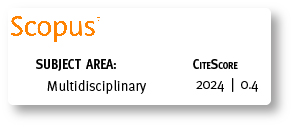Learning environment at home, mother's education level and early numerical performance of children
DOI:
https://doi.org/10.18537/mskn.08.02.02Keywords:
home experiences, mother's instruction, numerical abilitiesAbstract
Even before the start of formal schooling, there are large individual differences in children’s numerical performance, however, the knowledge about the mechanisms through which young children develop numerical abilities is limited. Certain contextual characteristics surrounding the children, including the home learning environment and the mother’s education, have been associated with children’s numerical performance. Research on this topic has been conducted mostly in developed countries, which makes the generality of those findings for developing countries, an open question. The aim of the present study was to examine the relations between the home learning environment and the mother’s education and the numerical abilities of first-grade children. A total of 176 cuencano children from public and private schools participated in the study. The results indicate that certain characteristics of the home environment, such as the numerical and literacy activities that parents perform with their children, are not related to the numerical performance of the children. However, the number of books for children available in the home is predictively related to their numerical performance. Similarly, the level of maternal education has a predictive relationship with children´s numerical performance.
Downloads
Metrics
References
Anders, Y., Grosse, C., Rossbach, H.-G., Ebert, S., Weinert, S. (2013). Preschool and primary school influences on the development of children’s early numeracy skills between the ages of 3 and 7 years in Germany. School Effectiveness and School Improvement, 24(2), 195-211. https://doi.org/10.1080/09243453.2012.749794
Anders, Y., Rossbach, H. G., Weinert, S., Ebert, S., Kuger, S., Lehrl, S., von Maurice, J. (2012). Home and preschool learning environments and their relations to the development of early numeracy skills. Early Childhood Research Quarterly, 27(2), 231-244. https://doi.org/10.1016/j.ecresq.2011.08.003
Anderson, A., Anderson, J., Shapiro, J. (2005). Supporting multiple literacies: Parents’ and children’s mathematical talk. Mathematics Education Research Journal, 16(3), 5-26. https://doi.org/10.1007/BF03217399
Aunio, P., Niemivirta, M. (2010). Predicting children’s mathematical performance in grade one by early numeracy. Learning and Individual Differences, 20(5), 427-435. https://doi.org/10.1016/j.lindif.2010.06.003
Clements, D. H., Sarama, J. (2007). Effects of a preschool mathematics curriculum: Summative research on the Building Blocks project. Journal for Research in Mathematics Education, 38(2), 136-163. https://doi.org/10.2307/30034954
Clements, D. H., Sarama, J. (2008). Experimental evaluation of the effects of a research-based preschool mathematics curriculum. American Educational Research Journal, 45(2), 443-494. https://doi.org/10.3102/0002831207312908
Clements, D. H., Sarama, J. (2011). Mathematics knowledge of low-income entering preschoolers. Far East Journal of Mathematical Education, 6, 41-63.
Duncan, G. J., Dowsett, C. J., Claessens, A., Magnuson, K., Huston, A. C., Klebanov, P., Pagani, L. S., Feinstein, L., Engel, M., Brooks-Gunn, J., Sexton, H., Duckworth, K., Japel, C. (2007). School readiness and later achievement. Developmental Psychology, 43(6), 1428-1446. https://doi.org/10.1037/0012-1649.43.6.1428; 10.1037/0012-1649.43.6.1428.supp (Supplemental)
Geary, D. C. (2011). Cognitive predictors of achievement growth in mathematics: a 5-year longitudinal study. Developmental Psychology, 47(6), 1539-52. https://doi.org/10.1037/a0025510
Geary, D. C., Hoard, M. K., Nugent, L. (2012). Independent contributions of the central executive, intelligence, and in-class attentive behavior to developmental change in the strategies used to solve addition problems. Journal of Experimental Child Psychology, 113(1), 49-65. https://doi.org/10.1016/j.jecp.2012.03.003
INEC (2012). Encuesta nacional de ingresos y gastos. Quito, Ecuador. Recuperado a partir de: www.ecuadorencifras.gob.ec/documentos/web-inec/Estadisticas_Sociales/Encuesta_Nac_Ingresos_Gastos_Hogares_Urb_Rur_ENIGHU/ENIGHU-2011-2012/EnighurPresentacionRP.pdf
Jordan, N. C., Kaplan, D., Ramineni, C., Locuniak, M. N. (2009). Early math matters: Kindergarten number competence and later mathematics outcomes. Developmental Psychology, 45(3), 850-867. https://doi.org/10.1037/a0014939.
Krajewski, K., Schneider, W. (2009). Early development of quantity to number-word linkage as a precursor of mathematical school achievement and mathematical difficulties: Findings from a four-year longitudinal study. Learning and Instruction, 19(6), 513-526. https://doi.org/10.1016/j.learninstruc.2008.10.002
LeFevre, J.-A., Polyzoi, E., Skwarchuk, S.-L., Fast, L., Sowinski, C. (2010). Do home numeracy and literacy practices of Greek and Canadian parents predict the numeracy skills of kindergarten children? International Journal of Early Years Education, 18(1), 55-70. https://doi.org/10.1080/09669761003693926
Lefevre, J. A., Kwarchuk, S. L., Smith-Chant, B. L., Fast, L., Kamawar, D., Bisanz, J. (2009). Home numeracy experiences and children’s math performance in the early school years. Canadian Journal of Behavioural Science, 41(2), 55-66. https://doi.org/10.1037/a0014532
Locuniak, M. N., Jordan, N. C., Kaplan, D., Ola, L. N. (2006). Number sense growth in kindergarten: A longitudinal investigation of children at risk for mathematics difficulties, 77(1), 153-175.
Melhuish, E., Phan, M., Sylva, K., Sammons, P., Siraj-Blatchford, I., Taggart, B. (2008). Effects of the home learning environment and preschool center experience upon literacy and numeracy development in early primary school. Journal of Social Issues, 64(1), 95-114. https://doi.org/10.1111/j.1540-4560.2008.00550.x
Missall, K., Hojnoski, R. L., Caskie, G. I. L., Repasky, P. (2015). Home numeracy environments of preschoolers: Examining relations among mathematical activities, parent mathematical beliefs, and early mathematical skills. Early Education and Development, 26(3). https://doi.org/10.1080/10409289.2015.968243
Pedhazur, E. J. (1997). Multiple regression in behavioral research: Explanation and prediction (3rd ed.). Fort Worth, TX: Harcourt Brace College Publishers.
Ramani, G. B., Siegler, R. S. (2011). Reducing the gap in numerical knowledge between low- and middle-income preschoolers. Journal of Applied Developmental Psychology, 32(3), 146-159. https://doi.org/10.1016/j.appdev.2011.02.005
Rendón-Macías, M., Villasís-Keever, M., & Miranda-Novales, M. (2016). Estadística descriptiva. Rev Alerg Mex, 63(4), 397-407.
Siegler, R. S., Ramani, G. B. (2008). Playing linear numerical board games promotes low-income children’s numerical development. Developmental Science, 11(5), 655-661. https://doi.org/10.1111/j.1467-7687.2008.00714.x
Siegler, R. S., Ramani, G. B. (2009). Playing linear number board games - but not circular ones - improves low-income preschoolers’ numerical understanding. Journal of Educational Psychology, 101(3), 545-560. https://doi.org/10.1037/a0014239
Skwarchuk, S. L. (2009). How do parents support preschoolers’ numeracy learning experiences at home? Early Childhood Education Journal, 37(3), 189-197. https://doi.org/10.1007/s10643-009-0340-1
Starkey, P., Klein, A. (2000). Fostering parental support for children’s mathematical development: An intervention with head start families. Early Education and Development, 11(5), 659-680. https://doi.org/10.1207/s15566935eed1105
Starkey, P., Klein, A., Wakeley, A. (2004). Enhancing young children’s mathematical knowledge through a pre-kindergarten mathematics intervention. Early Childhood Research Quarterly, 19(1), 99-120. https://doi.org/10.1016/j.ecresq.2004.01.002
STATCAN (2007). Census families, number and averages size. Recuperado a partir de www.statcan.gc.ca/tables-tableaux/sum-som/l01/cst01/famil40-eng.htm
Swanson, H. L., Jerman, O., Zheng, X. (2008). Growth in working memory and mathematical problem solving in children at risk and not at risk for serious math difficulties. Journal of Educational Psychology, 100(2), 343-379. https://doi.org/10.1037/0022-0663.100.2.343
van den Heuvel-Panhuizen, M., Elia, I. (2012). Developing a framework for the evaluation of picturebooks that support kindergartners’ learning of mathematics. Research in Mathematics Education, 14(1), 17-47. https://doi.org/10.1080/14794802.2012.657437
Downloads
Published
How to Cite
Issue
Section
License
Copyright © Autors. Creative Commons Attribution 4.0 License. for any article submitted from 6 June 2017 onwards. For manuscripts submitted before, the CC BY 3.0 License was used.
![]()
You are free to:
 |
Share — copy and redistribute the material in any medium or format |
 |
Adapt — remix, transform, and build upon the material for any purpose, even commercially. |
Under the following conditions:
 |
Attribution — You must give appropriate credit, provide a link to the licence, and indicate if changes were made. You may do so in any reasonable manner, but not in any way that suggests the licenser endorses you or your use. |
| No additional restrictions — You may not apply legal terms or technological measures that legally restrict others from doing anything the licence permits. |









